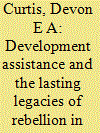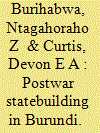| Srl | Item |
| 1 |
ID:
140333


|
|
|
|
|
| Summary/Abstract |
Rwanda and Burundi have both emerged from civil wars over the past 20 years and foreign donors have provided significant contributions to post-conflict reconstruction and development in the two countries. Yet, although Rwanda and Burundi share several important characteristics, their post-conflict social, political and economic trajectories have been different. This article argues that the nature of the ruling parties in Rwanda and Burundi is key to understanding the countries’ relationships with donors. Rather than seeing aid as an exogenous factor, causing particular development outcomes, it shows how local party elites exert considerable agency over the aid relationship. This agency is influenced by a number of different local contextual factors, including how the parties were established, how they evolved and the ways in which their civil wars ended. Thus, the article provides an analysis of how local context matters in understanding donor–recipient aid relationships, and how the ruling party in Rwanda (the RPF) and in Burundi (the CNDD–FDD) emerged from their respective conflicts with different relationships with international donors.
|
|
|
|
|
|
|
|
|
|
|
|
|
|
|
|
| 2 |
ID:
179821


|
|
|
|
|
| Summary/Abstract |
The widespread enthusiasm for internationally-supported liberal statebuilding since the 1990s has become much more tempered, due in part to the mixed record of postwar liberal statebuilding. Over time, many postwar countries have adopted more authoritarian statebuilding trajectories, despite the fact that negotiated peace agreements tend to reflect liberal principles. This is often attributed to ‘liberal’ international actors encountering resistant ‘illiberal’ domestic elites. The postwar statebuilding trajectory in Burundi appears to fit this dominant narrative, with the ruling party, the Conseil National pour la Défense de la Démocratie-Forces pour la Défense de la Démocratie (CNDD-FDD), deviating from some of the liberal principles that underpinned the Burundian peace agreement. Drawing on a detailed analysis of the internal politics of Burundi's ruling party, we show that this account is flawed. We question overly simplified accounts of ‘illiberal’ ruling party elites and we argue that tensions, competition and fragmentation within the ruling party were decisive in Burundi's statebuilding path. Rather than seeing Burundi as an inevitable failure of liberal statebuilding, we highlight how there was some commitment to liberal principles even within the ruling party. Internal struggles within the ruling CNDD-FDD led to current outcomes in Burundi, which should not be interpreted as predestined or definitive. We show that understanding the complexities, diversities and contingencies within ruling parties opens new spaces for thinking about the creation and recreation of political orders after war.
|
|
|
|
|
|
|
|
|
|
|
|
|
|
|
|